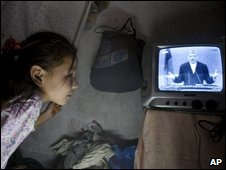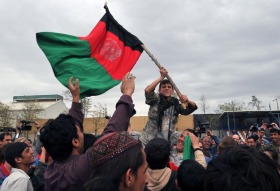
Overview
Like most years, 2010 was a tumultuous one for the country of Afghanistan and for all the actors intertwined in its present and future. The Obama administration’s 30,000 troop surge became a reality while its designer and leader, Gen. McChrystal was sent packing for his unprofessional remarks to a Rolling Stone journalist. The jury has not even be able to take their seats in judging the success/failure of the current surge strategy, but the Marja offense Operation Moshtarak, showcased some of the ways the increase in resources could help the security situation, but still fail to create a favorable situation for long term stability. 2010 began with a President Obama keeping President Karzai at arms length, including stern talk of failed progress, but ended the year by courting the troubled Afghan leader as a close partner. Overarching all of these issues was the July 2011 withdrawal deadline that the President announced just seconds after declaring the troop surge.
The parliamentary elections of brought with them new leaders that would challenge the Karzai administration, but also a litany of corruption charges that are still being sorted through. Drone strikes were also a key story with the US rapidly increasing their use inside of Pakistan. Bob Woodward did ‘what he do’, create controversy and bring to light a US President’s decision making process, in the ‘Obama Wars’, which showed a pragmatic leader who was as worried about how to get the US out of Afghanistan as get the new troops in. Lastly, the year 2010 saw 1,000 American troop death inside Afghanistan.
Most unexpected event of 2010
I have two winners for this category: The CIA Base Chapman disaster leaving 7 members killed and Wikileaks. Though I guess it shouldn’t be that surprising that a foreign outlet with a purpose of killing high level members of the opposing enemy was targeted by said enemy, but the Base Chapman attack caught me and obviously the CIA off guard. It was one of the worst CIA losses, which included the Base’s top CIA official who was apparently extremely well-versed in Al Qaeda/Taliban secret information, in history and featured a hard to believe story of what appears to be a triple agent who of course was a doctor in Jordan. Huh? This one attack no doubt changed the way the CIA operates their forward bases and from reports resulted in many follow up, retaliatory drone missile strikes against those Taliban/Al Qaeda elements deemed responsible.
As I have hopefully laid out clearly, I strongly disapprove of the Wikileak’s as an organization and the mainstream news outlets that worked with it to sell papers, cough, I mean bring to light important information. Nevertheless, the release of thousands of secret material documenting years of the American presence in Afghanistan was definitely ‘unexpected’. Of course, the stories that came out of the release were nothing that a person following the Afghan war didn’t know about already (Pakistan double dealing, Karzai is a little wacko, corruption is a major problem, etc.). If anything, the Wikileaks release of American Afghan war documents showcases an honest United States with no hidden agenda, contrary to what the people behind Wikileaks would want you to believe.

Person of the Year
I’m gonna have to go for President Hamid Karzai. Though Karzai’s effectiveness and trustworthiness are legendarily questionable, with his survival of last years presidential election and reversal of fortune in the eyes of the Obama administration, he has proven that he will be an important actor in what will coming consequential years in Afghanistan. In other words, Karzai is not going anyone and whether you’re the Taliban, NATO, Al Qaeda, or the United States, you are going to have to work with/through him to get anything seriously accomplished. If you want further proof, just go back and follow the evolution of the Obama administration’s posture toward the Afghan president.
What to watch in 2011
I’ll start with a quote from historian Trita Parsi: ‘I’m good at predicting the past’. 2011 will no doubt hold much importance for the coming shape of Afghanistan’s future. Here are some of the questions that the events of 2011 may help bring answers to: Will 2011 be the year that the US/NATO begin their seemingly inevitable departure from a military presence in Afghanistan? In other words, will President Obama stick to his self-declared July 2011 withdrawal date or will he let this date go by with only minor troop reductions? Will the 30,000 troop surge show real progress in tamping down Taliban-led violence and mayhem along with providing an environment of stability in Kandahar and Helmand? What about in Kabul and the previously quiet North? Will Karzai and elements of the Taliban begin actual substantive negotiations with members of the Taliban-led insurgency? Though the Afghan populace has shown resiliency in supporting the international military presence, will another year of staled progress push the plurality to the other side? Will the American populace continue to sour on the US presence in Central Asia and more vocally demand a change in strategy?
It looks like the coming year will bring the volume up to 11 in Afghanistan.
(Photo source: Foreign Policy Magazine)